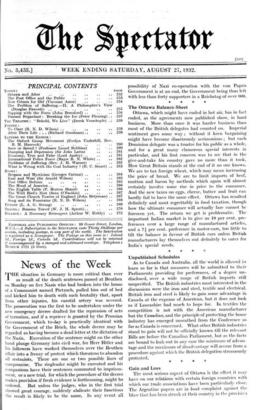The Ottawa Balance-Sheet Ottawa, which might have ended in hot
air, has in fact ended, as the agreements now published show, in hard business. More than once it was harder business than most of the British delegates had counted on. Imperial sentiment goes some way ; without it keen bargaining might have become disastrously acrimonious ; but each Dominion delegate was a trustee for his public as a whole, and for a great many clamorous special interests in particular, and his first concern was to sec that in the give-and-take his country gave no more than it took. How Great Britain stands at the end of it no one knows. We are to tax foreign wheat, which may mean increasing the price of bread. We are to limit imports of beef, mutton and bacon by methods which again will almost certainly involve some rise in price to the consumer. And the new taxes on eggs, cheese, butter and fruit can hardly fail to have the same effect. Ottawa has resulted definitely and most regrettably in food taxation, though how the ultimate consumer will actually fare cannot be foreseen yet. The return we get is problematic. The important Indian market is to give us 10 per cent. pre- ferences over a large range of manufactured articles, and a 71 per cent. preference in motor-cars, too little to tilt the balance in favour of British cars unless British manufacturers lay themselves out definitely to cater for India's special needs.


























